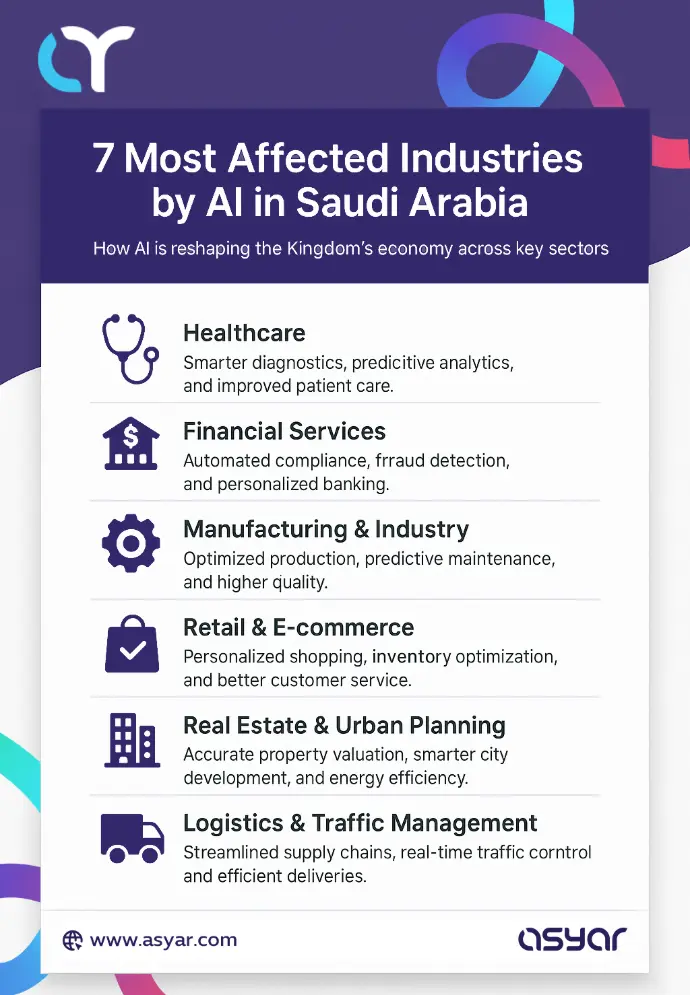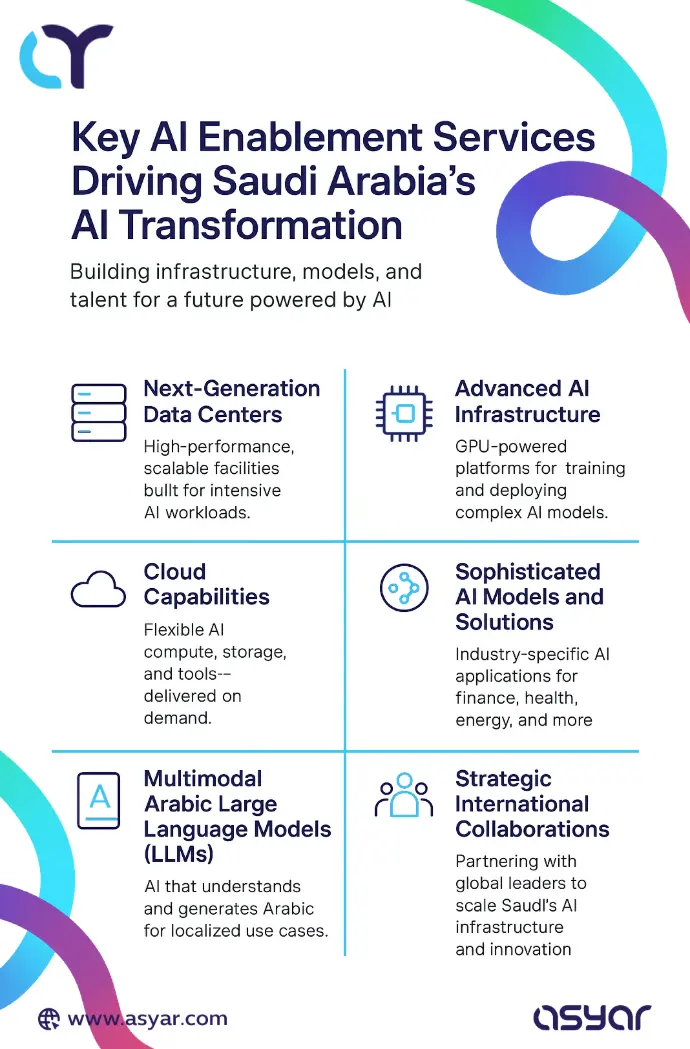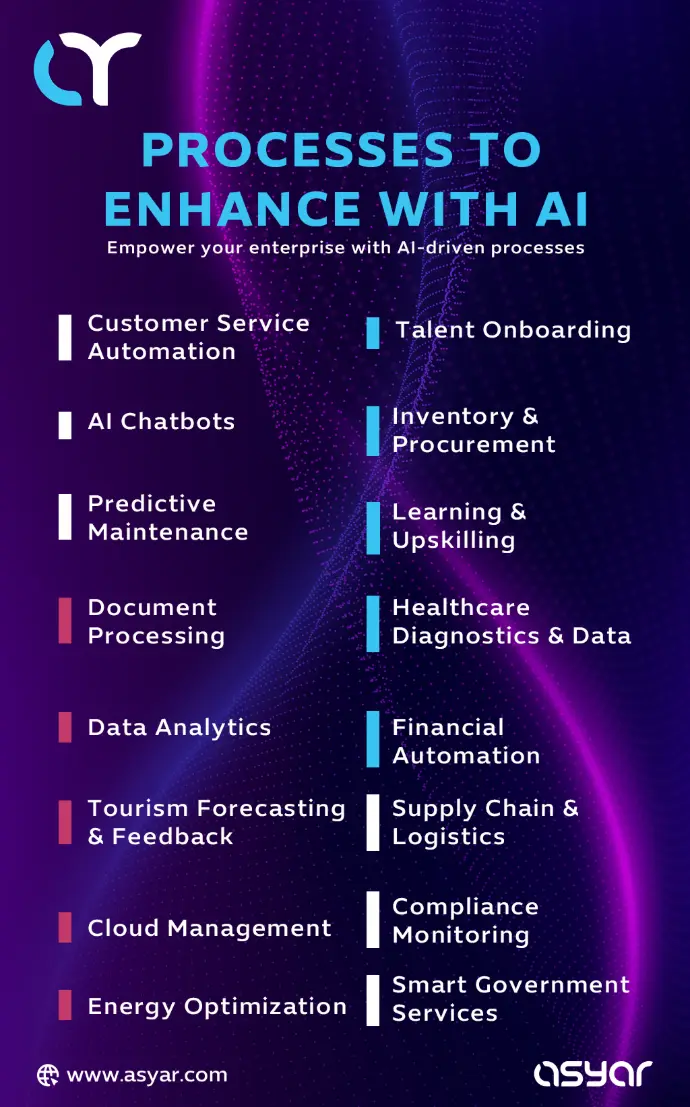AI has rapidly reshaped global industries. And today, Saudi Arabia is emerging as one of its most ambitious adopters and a global AI hub.
The Kingdom recently bolstered its support for AI with a $14.9 billion investment¹ in the sector, which was announced at LEAP25.
This investment emphasizes PwC's forecasts ² that AI will add $135.2 billion to Saudi Arabia’s economy by 2030, making it the largest AI economy in the region by far.
What is AI Enablement?
AI enablement is the strategic steps an organization takes to integrate AI effectively and responsibly into its operations. This empowerment can be achieved by disseminating knowledge, providing resources, supplying tools, or building skills.
In Saudi Arabia, AI enablement is primarily achieved through four key aspects:
1. Strategy through Vision 2030:
Saudi Arabia’s Vision 2030 places data and artificial intelligence at the core of national transformation. Of the 96 Vision 2030 goals³, 66 are directly or indirectly related to data and AI.
2. Massive investments in digital infrastructure
In 2024–2025 alone, the Kingdom attracted over $22.4 billion in investments for AI and data center infrastructure⁴.
3. Organizations like SDAIA and the National Data Bank (NDB)
The Saudi Data & AI Authority (SDAIA) and the NDB lead the national agenda for AI strategy and data governance.
SDAIA’s National Strategy for Data and AI (NSDAI) positions Saudi Arabia as a global AI leader, while the NDB enables secure, high-quality data access across industries.
4. Utilizing resources from the vast availability of energy sources (oil & gas or renewables)
With access to vast oil, gas, and renewable energy reserves, Saudi Arabia is uniquely positioned to power data-intensive AI systems.
The Kingdom is embedding AI in both its traditional energy sectors and its rapidly growing renewable initiatives, aiming for 50% renewable energy generation by 2030⁵.
Industries Benefiting from AI Enablement in Saudi Arabia

Challenges of Enabling Artificial Intelligence
AI enablement in Saudi Arabia comes with its fair share of challenges. Whether it’s the workforce, AI readiness, infrastructure issues, or ethical and legal concerns, there are many challenges to navigate when unleashing AI for business.
Shortage of AI-Trained Professionals
Challenge:
The rapid Saudi push for AI is widening the gap between market needs and available talent. Research suggests at least a 20% talent gap in AI⁶, while other reports estimate a gap of up to 50%⁷ in the Saudi AI market for the workforce.
Solutions:
- National strategies and initiatives, such as the National Skills Platform, seek to upskill the Saudi workforce and create a larger AI-ready talent pool.
- Outsourcing specific AI roles to expert companies can be a solid solution for companies to leverage AI on the short-term.
Building True Cyber Resilience
Challenge:
Tenable report in 2023⁸ revealed that 40% of targeted attacks on Saudi organizations were successful. Enabling AI, therefore, poses an even greater risk to data protection.
Solutions:
- Implementing comprehensive data governance frameworks that align with the Personal Data Protection Law (PDPL), SDAIA, and the new Global AI Hub Law.
- Real-time compliance monitoring and top-level secure data management systems.
AI Integration with Existing Systems
Challenge:
Many Saudi organizations continue to operate with legacy IT infrastructure that impedes seamless AI integration, such as siloed databases that sabotage real-time monitoring and predictive analytics.
Solution:
- Adopting modular integration frameworks with API-first architectures to bridge the gap between legacy systems and AI platforms.
- Employ cloud migration strategies for incremental infrastructure modernization to enable scalability without disrupting current operations.
Resistance to Change
Challenge:
AI enablement in Saudi Arabia faces resistance against cultural inertia and workforce concerns. PwC reports that 40% of Saudi CEOs have concerns over skill shortages⁹, while a global survey in 2022 reported that 30% of respondents fear losing their jobs to technology by 2025.
Solutions:
- Fostering an AI-positive culture by aligning business strategies with Saudi Vision 2030.
- Utilizing state-of-the-art technologies attracts employees to AI enablement by showcasing direct benefits.
How to automate your processes and empower your employees with AI
Strategic artificial intelligence implementation in Saudi businesses helps them reach their full potential.
AI-powered automation optimizes workflows, drives sustainable growth, and enhances value creation in alignment with the Kingdom’s Vision 2030 digital transformation objectives.
Here’s how AI can deliver meaningful business value:
1. Focus on repetitive tasks and prioritize by time consumption
Businesses can have the biggest ROI on task automation by streamlining laborious activities. AI virtual assistants cut down on scheduling and data entry, leaving more time for higher-value activities.
2. Leverage predictive analytics for faster decision-making
AI systems analyze historical and real-time data to forecast demand, optimize inventory, and anticipate maintenance needs. It helps you boost productivity and improve the quality of your insights through AI-driven data analytics.
3. Personalize employee training and development
Narrow the talent gap by upskilling your employees. Utilize AI platforms to assess skill gaps automatically within your workforce according to business needs. Contribute to Saudi Arabia’s Vision 2030 by supporting AI workforce development.
The Impact of Enabling Artificial Intelligence on Human Competencies and Skills Development
AI is one of the most transformative technologies, reshaping global markets. While concerns about people losing jobs are valid, these technologies also create new opportunities and roles.
Saudi Arabia is investing heavily in AI, but it’s also taking a careful, strategic approach to managing its wide-ranging impact.
1. Emergence of New Roles & Skills
AI training, prompt engineering, and AI strategizing, these are all skills and roles that only emerged recently. The World Economic Forum¹⁰ projects 69 million new roles globally in the next few years, partly due to AI.
In Saudi Arabia, agility, AI fluency, and creative thinking are now the top-ranked competencies in the future workforce.
2. National Upskilling Initiative
The AI-powered National Skills Platform is one of Saudi’s biggest upskilling initiatives which targets over 3 million workers with data-driven training courses in high-growth sectors such as cybersecurity and healthcare.
3. Academic and Industry Collaboration
The academic space is adapting to business demands, with 86% of Saudi universities¹¹ offering AI-focused undergraduate degrees, 56% offering master’s programs, and 9% providing doctoral studies.
We also see the business world's reaction, as leading international companies partner with the Saudi government for AI training initiatives.
Key AI Enablement Services
Businesses looking to benefit from enterprise AI solutions can utilize the many AI transformation services provided by the Saudi government or by specialized private companies.

AI Enablement in Saudi Arabia
Saudi Vision 2030 aims to simplify access to essential services and boost economic diversification, which are giant drivers of the Kingdom’s push toward AI adoption.
The excellent infrastructure foundation, coupled with the abundance of energy sources, allows Saudi Arabia to invest intensively in AI enablement.
As a result, the Saudi Emerging Technology Adoption Readiness Index has reached 74.69% in 2025, around 4% higher than the previous year¹² . Through strong leadership and strategic steps, Saudi Arabia now hosts a thriving AI ecosystem backed by digital infrastructure, hyperscale data centers, and a robust fiber and undersea cable network.
Now we see successful AI implementations in multiple industries.
- Education: AI-powered tools for enhancing learning by the Saudi Ministry of Education.
- Housing: AI forecasting of housing demand and urban growth for resource optimization by the Ministry of Municipal and Rural Affairs and Housing.
- AI Services: The Saudi Data & AI Authority (SDAIA) supports the private and public sectors in AI enablement and AI adoption strategy.
- Urban Development: Streamlining traffic systems and boosting energy efficiency in The Line megacity project.
- LLMs: SDAIA’s launch of ALLaM as an Arabic Language Model significantly boosts local businesses targeting AI adoption.
- Government Documentation: AI support for recruitment visa applications through Musaned, an app launched by the Saudi Ministry of Labor.
- Legal: AI-supported document processing for legal processes utilized by the Saudi Ministry of Justice.
- Data: Empowering businesses through data in the form of the National Data Bank, which is connected to over 200 government systems.
How to AI Strategy Development
Developing a strategy for AI enablement in Saudi Arabia is challenging, but with guidelines and government initiatives, there is immense support for implementing AI in business operations.
Following in the footsteps of the Kingdom’s Vision 2030 helps businesses align with the bigger picture and form a structured and phased approach.
1. Defining Clear Objectives and Priorities
Measurable and attainable targets and specific ROIs help businesses focus their AI adoption efforts.
2. Establishing Governance and AI Units
Set up internal AI teams to lead projects, ensure alignment with strategic goals, and promote responsible AI practices.
3. Assessing AI Maturity & Readiness
Using SDAIA’s framework to define your unit’s maturity level (Emerging, Developing, Proficient, Advanced) helps set priorities and define adoption stages.
4. Building a Skilled Workforce
Headhunting, outsourcing, and upskilling help foster an AI-oriented workforce capable of implementing strategies.
5. Developing Data Infrastructure
Robust cybersecurity and data management systems are essential for AI adoption.
6. Implementing Ethical and Regulatory Frameworks
An ethical AI approach is essential to comply with the Saudi government's vision and guidelines (PDPL) for AI enablement.
7. Pilot and Scale Use Cases
According to your priorities, begin with high-impact AI use cases, measure ROI, refine where needed, and scale across business units.
Best Practices for AI Development in 2025
As Saudi Arabia accelerates its AI ambitions under Vision 2030, businesses must keep up by adhering to best practices for AI enablement to achieve responsible, ethical, and sustainable AI adoption.
- Compliance with Saudi’s Draft Global AI Hub Law, PDPL, and guidelines proposed by SDAIA, especially concerning AI ethics.
- Establishing robust AI governance structures clearly defining scope, roles, and responsibilities.
- Utilize scalable, secure, and sovereign AI infrastructure such as next-generation data centers and cloud-edge hybrid platforms that guarantee data sovereignty, cybersecurity, and high availability.
- Investing continuously in workforce upskilling and talent development through partnerships with academic institutions and governmental initiatives for more successful AI enablement in Saudi Arabia.
- Documenting AI model development and configuration to enable auditability and ease future scaling processes.
- Track AI performance using clear KPIs and act quickly to adjust when needed.
- Maintain collaboration with other entities in the public and private sectors for boosting overall AI enablement within the Kingdom.
What types of processes can be enhanced with AI?

Ethical and legal considerations in enabling artificial intelligence
AI adoption in Saudi Arabia is guided by robust ethical and legal frameworks, including the Draft Global AI Hub Law and SDAIA’s AI Ethics Principles.
These frameworks emphasize fairness, transparency, accountability, and data privacy, aligning closely with the Personal Data Protection Law (PDPL).
Below are the top legal and ethical risks and how Saudi businesses can address them:
- Personal data misuse and privacy breaches in AI systems. Ensure strict compliance with PDPL andimplement end-to-end encryption and controlled access mechanisms.
- Lack of transparency leading to biased AI decisions. Adopt SDAIA’s AI Ethics Principles to ensure model explainability, transparency, and inclusive datasets.
- Unregulated experimentation causing societal harm or ethical violations. Utilizing regulatory sandboxes to safely test AI use cases before scaling.
- Legal ambiguity over AI-related damages or liability Establish internal AI governance and accountability frameworks aligned with national regulations.
- Infringement on copyrighted material by AI models Enforce strong content usage policies and audit training datasets to comply with the Saudi Authority for Intellectual Property (SAIP) and avoid penalties.
Why Choose Asyar as Your AI Enablement Partner?
As Saudi Arabia rapidly scales its AI ecosystem, choosing the right AI enablement partner and technology is essential to achieving sustainable growth. Asyar delivers secure, scalable, and tailored AI solutions that help organizations across both public and private sectors accelerate digital transformation.
Our deep local expertise and strategic partnerships with global tech leaders enable us to help you modernize operations through intelligent AI integration, improve agility and decision-making, and fast-track innovation where it matters most.
Ready to accelerate your AI journey?
Sources
PwC: The potential impact of Artificial Intelligence in the Middle East
SDAIA and Vision 2030 Strategy
Saudi Vision: Rise of Humain and the Kingdom’s Strategic AI Ambitions
The Synergy of AI and Renewable Energy in Saudi Arabia
Most In-Demand Tech Job in Saudi Arabia in 2025
Saudi Arabia launches AI-powered National Skills Platform to up-skill 3 million workers
Tenable Study Reveals 40% of Cyberattacks Breach Saudi Arabian Organisations’ Defences
PwC CEO Survey 2025: Saudi Arabia Findings
World Economic Forum: FOJ Job Market Survey
How Saudi Arabia's mission to become a global AI hub sparked a skills revolution